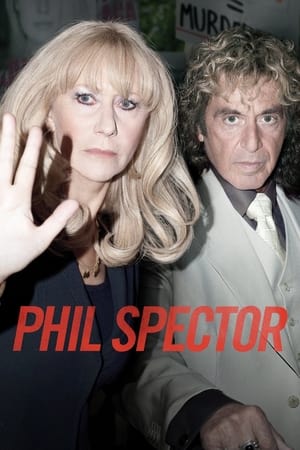
Phil Spector
Phil Spector begins by warning us that “This is a work of fiction. It is not based on a true story. It is a drama inspired by real people in a trial, but it is not an attempt to represent the real people, nor to comment on the trial or its outcome.” This raises several questions. First, if it’s not an attempt to represent real people, why are the characters named after real people? Are you trying to tell me that this is a movie about a record producer charged with murder named Phil Spector, but it's not a movie about actual record producer charged with murder Phil Spector? Second, the fictional Phil Spector is indicted for the murder of actress and model Lana Clarkson, just like the real Phil Spector; how then can the movie claim that it’s not based on a true story? Third, if it’s not an attempt to comment on the trial or its outcome, what’s the hell’s the point? This should have been either a film à clef or a documentary — to paraphrase John the Revelator, either hot or cold because I spit the lukewarm out of my mouth —; as it is, though, it’s neither fish nor fowl. What the movie actually is is the opposite of what it purports to be; i.e., behind its claim to objectivity, the film is subjective to the point of hagiography. According to writer/director David Mamet, Spector (Al Pacino) was nothing more than a "beloved eccentric" condemned, not by the evidence against him — little or none, according to the film but by public opinion and an incompetent defense lawyer. The latter is odd considering that Linda Kenney Baden (Helen Mirren), his defense attorney, served as a consultant for the film; apparently Baden was so entranced by Spector and grief-stricken that she couldn't save him from a wrongful conviction, that she simply forgot, when advising Mamet, about the prosecution's evidence that refutes her evidence — her evidence being the sole basis on which the movie swears by Spector's innocence. But the revisionism of the film is not limited to Spector, and reaches Baden as well; for example, the fictional Baden declares that she will not "attack the girl", that is, Clarkson, to defend Spector; in fact, the defense did attack Clarkson in court, going so far as to show a video of Clarkson in blackface imitating Little Richard, unlike the fictional Baden, who refuses to use this footage (this doesn’t mean by the way that the film as whole doesn’t attack Clarkson) — furthermore, Baden-Mirren appears to be clairvoyant; early in the film she says that since "they let O.J." go, Spector will pay the piper; “He will be tried for the murder of O.J.’s wife and he will be found guilty” (and if this isn't a comment on the trial or its outcome, I don't know what the hell it is). All things considered, it’s ironic when the movie asserts that “The prosecution has nothing except everyone's conviction that [Spector] is guilty”; it’s actually Mamet who has nothing except his conviction that Spector is innocent. Phil Spector amounts to nothing much other than a reminder that "even Homer nods"; Mamet wrote and/or directed some of the best films of the '90s-mid-2000s, and even his comparatively inferior work could never be accused of dishonesty or malice. However, with this one it becomes clear that this is the Al Pacino movie that should be called The Devil's Advocate.
